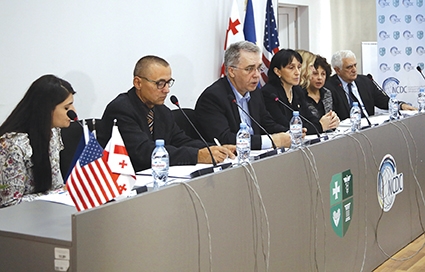Antibacterial Awareness: Fine Line Between Cure & Further Illness
On November 14, at the National Center for Disease Control and Public Health, under the Ministry of Labor, Health and Social Care, held a conference dedicated to the Global Week of Antibiotic Awareness was held.
This year, the conferences focused on the prevention and control of infections. Infections associated with medicines are one of the most wide-spread complications in the medical sphere. Purportedly, the majority of them are caused by pathogens which are resistant to antibiotics. The Global Week of Antibiotic Awareness aims at increasing knowledge of the population, medical personnel and politicians, about resistance to antibacterial medications.
“This event is dedicated to the world day of resistance to antibiotics. This is one of the growing challenges we face within healthcare. Antibiotics have their own concrete function and thus, they should be applied on the basis of a doctor’s prescription, and not on the basis of self-treatment,” said Davit Sergeenko, Minister of Labor, Health and Social Care.
“Antibiotics have saved the lives of several million people, but on the other hand, their irrational utilization has obliged us to face the problem that is connected with anti-microbe resistance in the treatment of tuberculosis, for example, as well as in the treatment of other infections. Therefore, Mankind faces a very big challenge, which can only be prevented by as much awareness among the population as possible, in order not to use antibiotics improperly,” said Amiran Gamkrelidze, Director of National Center on Disease Control and Public Health.
“For most communicable diseases, we have medicines available. If microbes become resistant to those medicines, people can die because [it will mean that] we have no medicines to treat the diseases. We know this can happen in the case of tuberculosis, pneumonia, and so on. What is important is that patients should not buy antibiotics over the counter. They should only be available on prescription, and patients should know how to take medicines, and complete treatment as is prescribed. Otherwise, they run the risk that the bacteria they have in the body can become resistant, and their disease will not be treated. This can lead to more complex and very expensive treatment, and can even result in death,” Dr. Marijan Ivanusa, Head of WHO Country Office told the audience.
The World Week of Public Awareness on Antibiotics has run since 2015. According to the involved parties, resistance to antibiotics has no boundaries and suggests that everyone become involved in the campaigning of raising awareness on antibiotics.
Maka Lomadze












